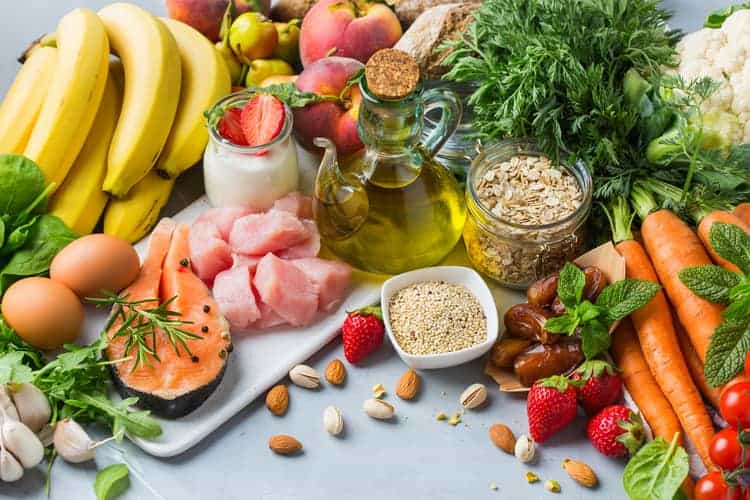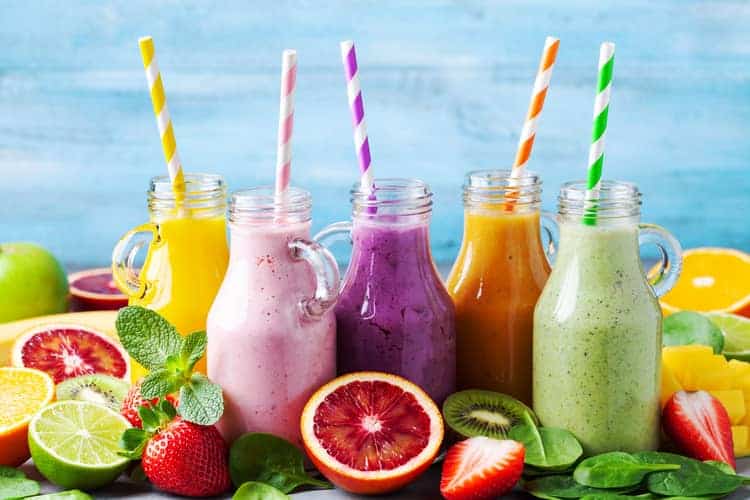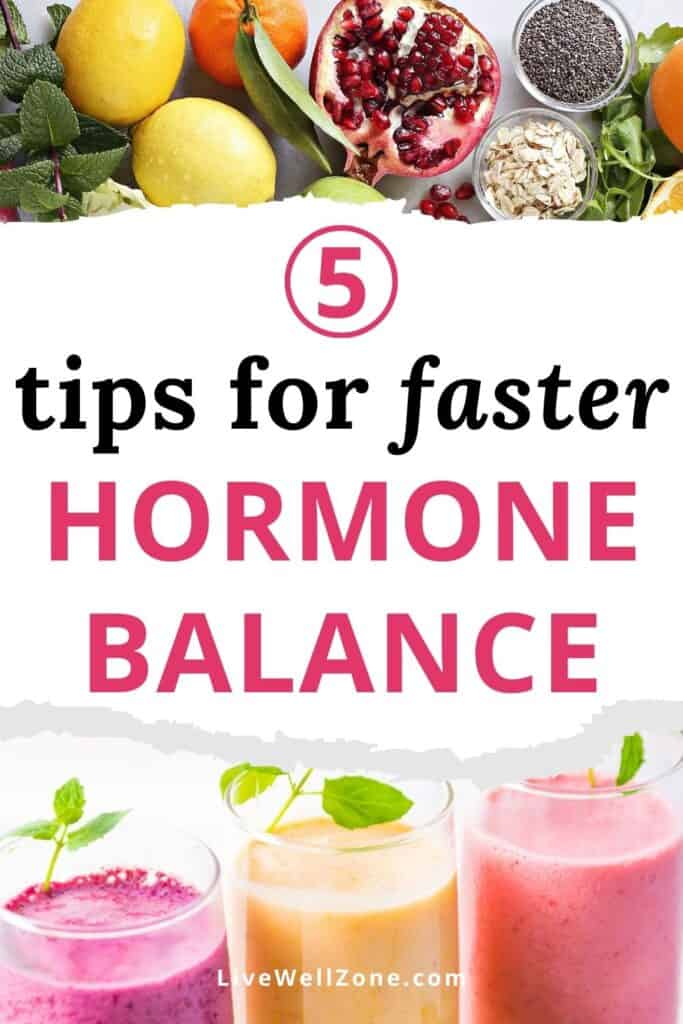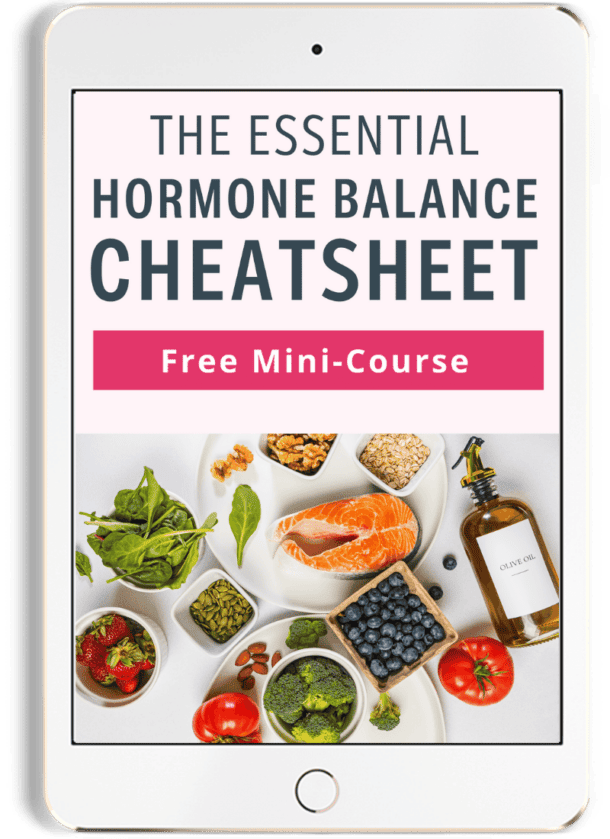
No matter which hormonal imbalance symptoms you have and no how matter how long you’ve been managing them, one thing’s for sure: you want them gone. Like yesterday. In fact, maybe you’ve even wondered “can I balance your hormones in a week?“
While there’s no magic wand that can turn everything around in a few days, it’s possible to experience noticeable changes in a week. We’re talking less bloating, more energy, better sleep, weight loss kickstart and almost complete elimination of chronic (back) pain.
This isn’t my opinion. It’s based on the changes that have been reported by women who’ve followed my DIY programs (and my one-on-one coaching).
In some cases, I’ve seen jaw-dropping improvements. Such was the case with a diabetic (private) client who lowered her blood sugar by 100 points in just two weeks (her blood sugar had skyrocketed to over 250!). Of course, we had to work on some very specific dietary changes that are beyond the scope of this article!
But the point is, you’d be amazed at what you can do in a week, if you’re willing to give yourself a chance.
So, in this article, I’m giving you 5 powerful tips that you can start implementing to help you reach your goals. Of course there are no guarantees as to whether or not these will work for you.
All I can say is that these tips are part of the process that I used when working with clients as well as when putting together my programs. I hope they bring you some relief.
HOW TO BALANCE YOUR HORMONES AND START FEELING BETTER (IN AS LITTLE AS A WEEK)

1. Double Down On Smoothies
If you do nothing else from this list, at least do this one things: drink 2 smoothies a day. One with your usual breakfast and the other as your afternoon snack (or with your normal dinner). No need to make any other changes to your diet.
So, why two smoothies?
Well, back in the summer of 2019 I ran several 5-day smoothie challenges with women of various ages and backgrounds. And they all followed the exact same suggestion I’ve shared above.
Within those 5 days some reported feeling more energetic, sleeping better and having healthier-looking skin. Others reported that the smoothies helped them overcome the dreaded 3pm slump (which usually leaves many of us reaching for an unhealthy snack).
Now, for this to work, your smoothies must meet a few criteria:
- Contain whole fruits and/or vegetables (can be fresh or frozen).
- If you want protein in the smoothie, it must come from a whole food sources like nuts and seeds (the equivalent butters are fine too). No protein powders.
- No processed sugar or processed sweeteners.
- Use water or plant-based milk (no cow’s milk).
- No special powders like maca or ashwagandha (they’re great for hormones, but when drinking two smoothies a day, you run the risk of using too much).
It can be a green smoothie or an all-fruit smoothie; whatever you like. Just make sure to stick to the above guidelines and give it a go for 7 days.
2. Go Easy on Breakfast
Most of us were raised with the belief that breakfast is the most important meal of the day.
As as a result, we’ve developed the habit of eating a very filling breakfast. If the meal is well-balanced – like with these hormone-friendly breakfast ideas – it can work out just fine.
But for some people, even a healthy breakfast can make them feel worse. Here’s why:
- Normally, cortisol increases in the morning. This is necessary to wake us up and to give us the urge to eat.
- However, when there are hormonal imbalances – especially due to adrenal fatigue – this natural cortisol peak doesn’t happen (source). So, you start off your day already feeling tired and working at a deficit.
Now, imagine having a heavy breakfast, plus a cup of coffee to help you wake up.
Well, all that does is force your body to do more work (i.e. digest the food). In addition, coffee stimulates the adrenal glands, which isn’t a good thing in this case since they’re usually overworked.
So, if you’re someone who’s already quite drained and fatigued, consider having a light but nutrient-rich breakfast, such as:
- Fresh-pressed juice.
- A smoothie.
- A fruit bowl.
The goal here is to give your body food that is nutritionally dense, yet easy to digest. That way your body can ease into the day.
As the morning progresses you will likely get hungry. At that point you can have a mid-morning snack.
3. Experiment with Dairy Free Options
Dairy is a common allergen that can trigger the body’s inflammatory response.
When the inflammatory response is activated, that means the adrenals release anti-inflammatory hormones like cortisol.
This is great in the short-term. But if this inflammatory response becomes chronic, then that leads to chronically elevated cortisol.
And unfortunately, chronically elevated cortisol can have a detrimental effect on other hormones, including insulin and all the sex hormones.
So, consider cutting back on dairy, especially unfermented dairy products like cow’s milk. Instead, reach for plant-based milks.
As for fermented dairy, it generally has more health benefits. So you can experiment with keeping it in your diet. However, buy only organic ones if possible.
This minimizes the risk of being exposed to trace amounts of antibiotics and hormones that are given to conventionally-raised cows.
4. Consume Green Veggies Daily
Whether it’s kale, broccoli or zucchini, get into the habit of eating some kind of green vegetable every single day, at least twice a day so you get more nutrients.
They’re a really good source of vitamins, minerals, antioxidants and other anti-inflammatory compounds.
And perhaps most importantly, these foods are rich in fiber, which supports gut health (another important element for hormone health).
And if that’s not enough, cruciferous veggies – such as kale, cabbage and brussel sprouts – contain sulphur-based compounds that metabolize estrogen (a plus for anyone struggling with estrogen dominance).
5. Replace Some Meat-Based Meals With Beans
Meats like chicken, beef and turkey are good for one thing only: protein.
But if you’re looking for all the other stuff that supports hormone balance – antioxidants, vitamins, minerals, fiber, prebiotics or probiotics – then meats are not much help.
So, if you consume meats every day start replacing some of those meals with a bean-based meal.
Beans are way more nutrient dense because not only do they contain proteins, but they also have (source):
- Fiber.
- B-vitamins.
- Minerals (such as folate and magnesium).
- Antioxidants (such as flavonoids and phenols).
- Inositol (a natural sugar that can be very helpful for women with PCOS – more about it here).
Now if there’s one meat that ranks above the rest, it’s fish. Especially fatty fish like mackerel, sardine and salmon.
Fatty fish contains omega-3 fatty acids which are anti-inflammatory and beneficial for keeping the body in homeostasis (i.e. natural balance).
FOODS AND DRINKS TO BALANCE HORMONES
If you’re wondering which foods are safe to eat for your hormones, the short answer is that all whole foods are fine to consume.
For a more detailed breakdown by category (fruits, veggies, flours, spices, meats and so on), then read this guide on what to include in a hormone-balancing diet plan. There’s also a free printable list in that article that you can grab.
Now, when it comes to drinks you can lean on things like:
- Herbal teas.
- Kombucha
- Apple cider vinegar drinks.
- Juices.
- Saltwater (yes, some alternative health practitioners use it for adrenal support).
In this guide on juicing for hormone imbalance I break down the benefits of juicing and I also share some recipes you can use. Use it as a starting point if you’d like to learn more.
As for all the other beverages, read this article on what to drink for hormone balance. It’s got lots of tips and recipes you can use.
VITAMINS AND SUPPLEMENTS FOR HORMONAL IMBALANCE
The most important thing to know about vitamins and supplements is that they are not a must-have.
However, when combined with a healthy diet, they can help you move things along faster.
In this article on supplements for female hormone imbalance, I share the three main types of supplements that I like as well as the brands I recommend.
- a green juice powder.
- a daily multi-vitamin.
- a women’s herbal formula (capsules).
CONCLUSION: HOW LONG WILL IT TAKE TO BALANCE MY HORMONES?
While it’s possible to start seeing improvements within a week, fully recovering from hormonal imbalance can take months or longer. It really depends on various factors such as:
- How long you’ve had your symptoms.
- How many symptoms you have.
- Your current diet and lifestyle.
- Surgeries you’ve had.
- Drugs you’re currently using or have used in the past.
Even though I shared some general guidelines in this article, please remember to listen to your body and make adjustments as necessary.
And if you’re using any medications or supplements, check with your doctor before adding other things to the mix.
Lastly, please remember that when you do find the right foods for you, you have to make them part of your lifestyle.
Hormone balance is a lifestyle and long-term commitment. So, always keep in mind that the habits you develop now are habits that you will integrate into your life for the long-term.

Related Posts:
The Top 5 Hormone Balancing Foods to Eat Daily
Exercise for Hormone Balance: A Complete Guide
45 Affirmations for Hormonal Balance
The Beginner’s Guide to Natural Hormone Balance: 8 Essential Tips


